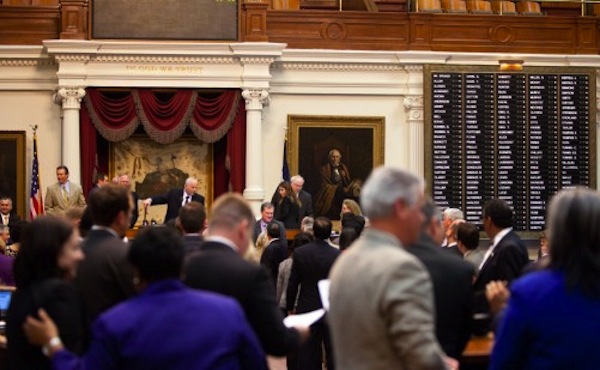'Come and Take It' Gun Enforcement Bill Passes Texas House

House Bill 928, also known as the "Come and Take It" law, passed the Texas House on May 8. The legislation mandates that no state money can be spent to enforce federal firearm regulations that do not also exist in state law and is a push-back against proposed federal rules on firearms and ammunition. However, it does not penalize state law enforcement officers who help the feds.
The legislation was written by Republican Representatives Matt Krause (R-Arlington), Scott Sanford (R-McKinney), Allen Fletcher (R-Cypress), George Lavender (R-Texarkana) , and Kenneth Sheets (R-Dallas). According to Matt Krause's website, the idea for the bill came from the works of Mario Loyola, In the article States and the Gun-Control Fight, Loyola wrote:
“We know that federal law cannot require state agencies to participate in a federal program. We know that because the Supreme Court’s most important federalism case of the last 30 years – Printz. v. United States (1997) – tells us that the federal government can’t command the states to do anything. In fact, Printz struck down a part of the Brady Act that required state officials to process background checks on prospective gun purchasers. The Court ruled that this offended ‘the structural framework of dual sovereignty.’ In a classic opinion by Justice Antonin Scalia, the Court observed, ‘The power of the Federal Government would be augmented immeasurably if it were able to impress into its service–and at no cost to itself–the police officers of the 50 States.’“
“It’s a simple bill that says that while we recognize the federal government’s right to enact firearms laws that overstep our state laws, we won’t be using any local or state tax dollars to help them,” Representative Matt Krause said to the Austin American-Statesman. “It encompasses the mentality of the flag that flew during the Texas Revolution. It tells the federal government: If you want to enforce your firearms laws, you’ll have to come do it yourself."
The bill was approved by the House with a 100-31 vote. Opponents of the bill argue that it's unconstitutional and could force a shutdown with federal officials.
After the bill moved to the senate, it was referred to the Agriculture, Rural Affairs & Homeland Security Committee, where it was scheduled for a hearing on May 13. Because Krause has not yet found a sponsor in the Senate, the bill faces a tougher challenge.



